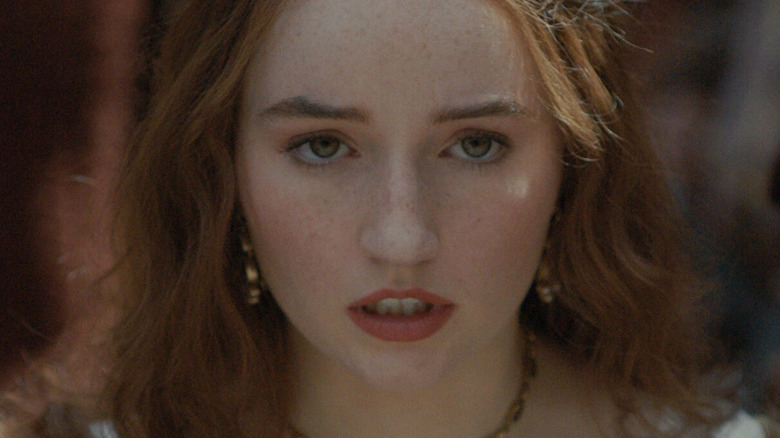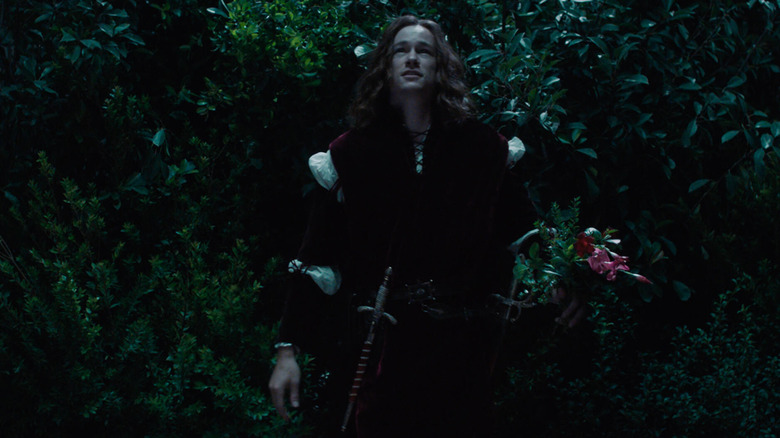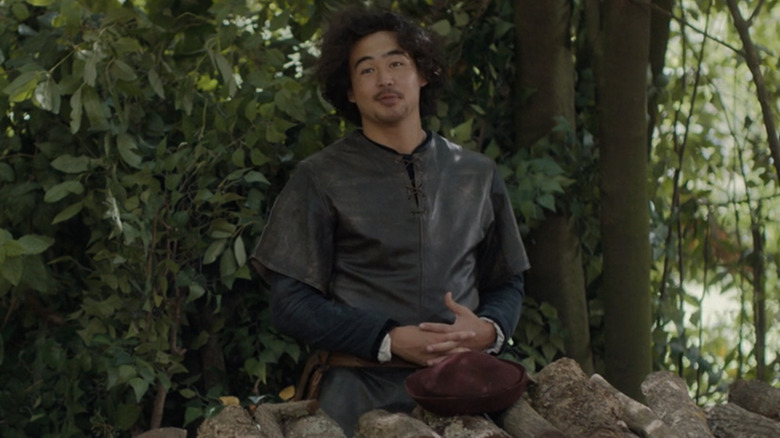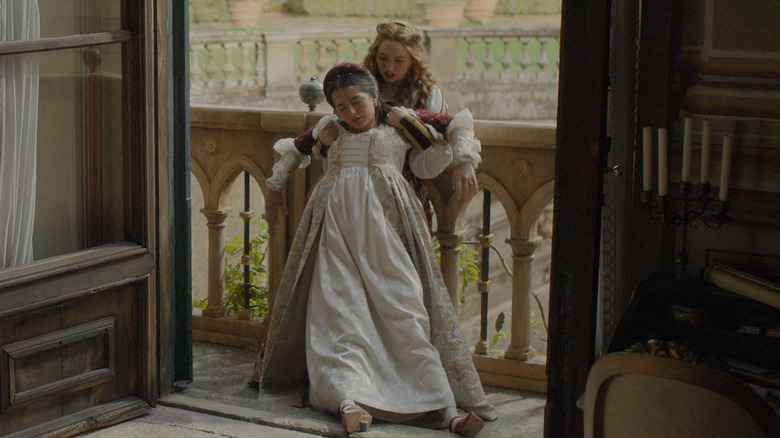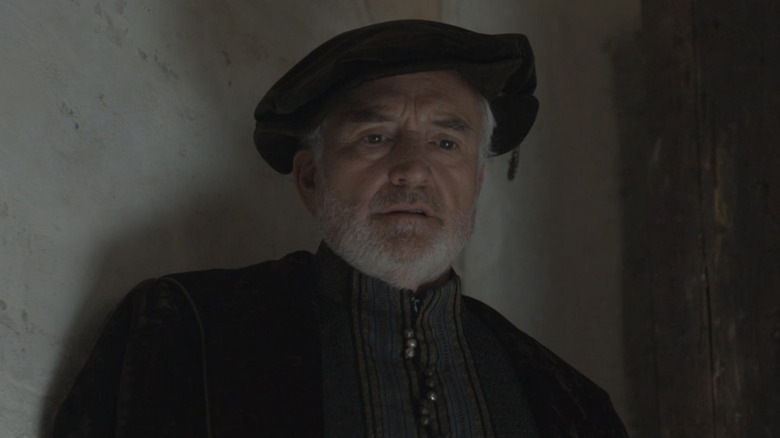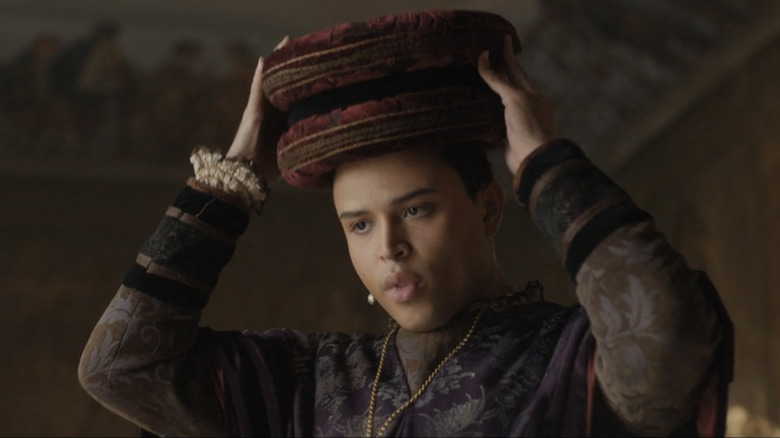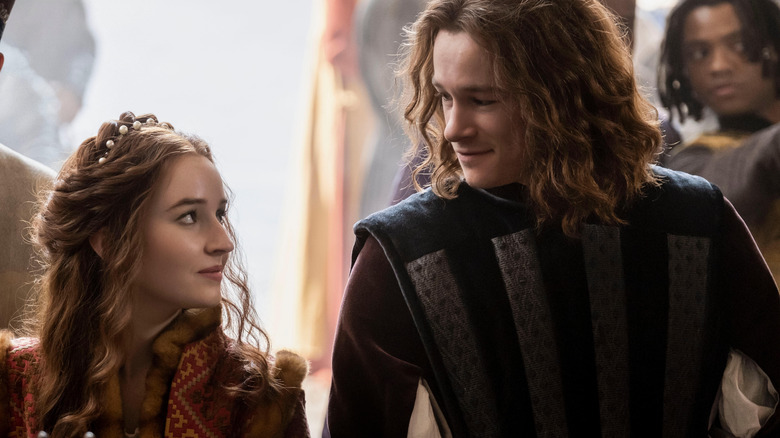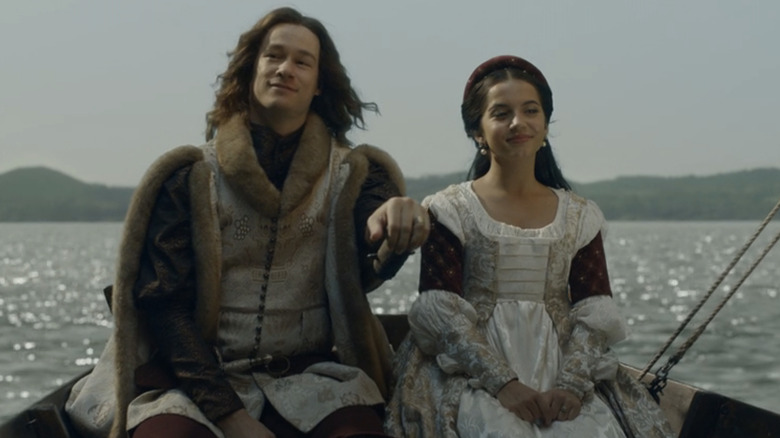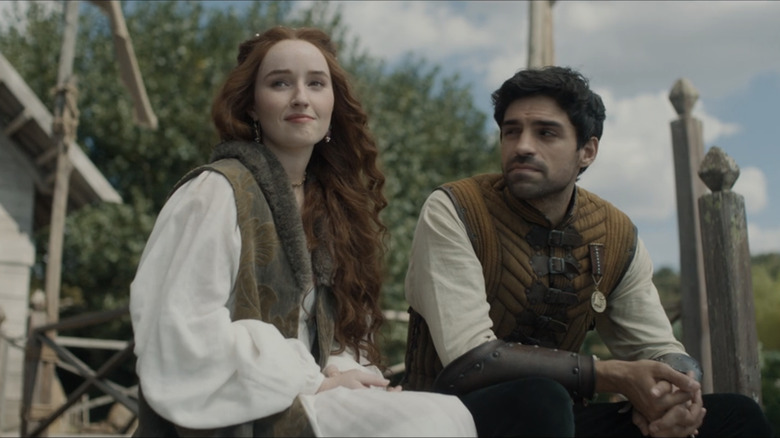The Ending Of Hulu's Rosaline Explained
Hulu's romantic comedy "Rosaline" takes a fractured fairy tale look at the world's most famous young lovers, Romeo and Juliet. As Shakespeare wrote it in his classic tragedy, Romeo begins the play heartbroken by the loss of his love Rosaline; when he goes to a masquerade ball thrown by the Capulets, mortal enemies of Romeo's family, he hopes to see Rosaline there. Instead, he falls instantly for the lovely Juliet. Romeo's ex is never actually seen in the play, but "Rosaline" (based on the novel "When You Were Mine" by Rebecca Searle) places her at the front and center of a story where he is the one who dumped her.
With contemporary dialogue and music playing alongside renaissance costumes and locations, "Rosaline" in many ways feels like a throwback not just to the 1990s era of Shakespeare-influenced teen comedies like "10 Things I Hate About You," but to the old Bob Hope period spoofs like "Casanova's Big Night." Rosaline (Kaitlyn Dever) is a young woman with modern ambitions who is constantly thwarted by the sexism of her era. When Romeo (Kyle Allen) unceremoniously dumps her for her cousin Juliet (Isabela Merced), she schemes to break up the star-crossed couple. But is that really who she is? And is the dim-witted Romeo really the one she wants? The film makes a hash of Shakespeare, and in the process dares to imagine a happy ending for the world's most famous tragedy. Let's take a look at the ending of "Rosaline."
A happy ending?
Though it feels like heresy to rewrite "Romeo and Juliet" with a happy ending, in reality this is nothing new. The popularity of Shakespeare's work has waxed and waned over the centuries, and just like today, his plays were often adapted or rewritten to suit contemporary tastes (via The Shakespeare Birthplace Trust). In the 1680s, poet Nahum Tate infamously rewrote "King Lear," one of Shakespeare's bleakest tragedies, to have a happy ending, and his take was actually the preferred version of the play for more than 150 years. Adaptations of "Romeo and Juliet" in the 17th and 18th centuries by William Davenant and David Garrick emphasized different aspects of the text, minimizing or expanding different characters and even borrowing from other Shakespeare works, though the tragic ending was usually kept intact (per The Royal Shakespeare Company). Happy endings for the lovers can be found, however, in adaptations for other media, as in Georg Benda's 1776 opera and in the original, censored version of Sergei Prokofiev's 1935 ballet (via The Guardian).
In 1838, "Cyrano de Bergerac" playwright Edmund Rostand used the play's warring families to comedic effect in "The Romantics" (later adapted into the 1960s musical "The Fantasticks"), and of course Leonard Bernstein and Stephen Sondheim's "West Side Story" transported Shakespeare to Manhattan for a slightly less tragic tale of gang warfare (only one lover dies). More recently, Richard Nelson explored the history of Shakespeare's rewritten tragedies in his 2009 play "How Shakespeare Won the West," and in 2021 St. Petersburg, Florida's American Stage produced a new self-explanatory adaptation titled "Romeo & Juliet in America (The One with the Happy Ending)" (per The St. Petersburg Catalyst).
Based on the Novel
Over the years, "Romeo and Juliet" has proven fertile ground not just for plays, films, and operas, but for books as well. In 2010, Rebecca Serle's young adult romance novel "When You Were Mine" arrived with a modern-day telling of a "Romeo and Juliet"-like love affair from the perspective of jilted ex Rosaline. The project apparently languished for several years; in a recent interview with Yahoo News, Dever mentioned that she had auditioned for the role of Juliet when she was 15 years old in 2011, and never heard back until 2020 when the rights were released by MGM and acquired by 20th Century Studios (as chronicled by Deadline).
Despite being credited as the source material for the film, Serle's novel actually bears little resemblance to what director Karen Maine and screenwriters Scott Neustadter and Michael H. Weber ("500 Days of Summer") put up on screen. For starters, the novel takes place in modern day southern California, where Rosaline (or "Rose") is dumped by her Romeo ("Rob Monteg") in favor of her "slutty" (in the book's parlance) and vindictive cousin Juliet. There were clearly a lot of changes made at the script level — changing the setting back to Renaissance-ish Italy, adding a snarky sense of humor — but perhaps the most impactful was giving Rosaline and Juliet a much more nuanced relationship than the novel's good girl/bad girl dynamic. Here, it's Rosaline who connives against Juliet to get Romeo back until Juliet's fundamental decency causes her to reconsider her actions.
Steve the Courier
Rosaline's change of heart comes after she and seafaring hottie Dario (Sean Teale) fail to stop Romeo and Juliet's secret marriage. Resigned to the fact that Romeo and her cousin are perfect for each other, she writes a letter to Juliet saying as much and entrusts it to Verona's inept postman, Steve the Courier (Nico Hiraga) — who delivers it not to Juliet, but to her violent cousin Tybalt. Rosaline sees the unintended consequences of her letter soon after, as Tybalt lies dead in the town square and Romeo is wanted for murder.
Here we see the way that the film prioritizes being the story of Rosaline rather than of Romeo and Juliet as Shakespeare wrote them. In the play, there is no active role in the story for Rosaline, and no such letter; Tybalt draws Romeo into a fatal duel not because of his secret marriage to Juliet, but by virtue of being a Montague. But here, Rosaline's actions throughout the film — her romance with Romeo, her scheming against Juliet, and her eventual change of heart — cause the first tragic domino to fall, and it's up to her to prevent any more death if she can. And of course, there is no Steve the Courier in "Romeo and Juliet," though he does fit the mold of Shakespeare's comic characters within tragic plays, such as the gravediggers in "Hamlet" or, with his cheerful stoner vibe, the drunken servants in "The Tempest."
No Friars
The circumstances of Romeo and Juliet's deaths in Shakespeare's play are more than a little convoluted. Certain that she and Romeo would never be able to be together, Juliet turns to kindly Friar Laurence for help. He gives her an elixir that will render her so paralyzed that she will appear lifeless; if her family believes her to be dead, then she and Romeo will be free to love one another, the rationale goes. Friar Laurence writes a letter to Romeo explaining the scheme and gives it to Friar John to deliver, but because of an outbreak of plague in Verona happening at the same time, Friar John is unable to deliver it. Romeo, hearing the news that Juliet is dead and believing it to be true, buys real poison from an apothecary with the intention of killing himself.
It's a lot to get through, and "Rosaline" finds an elegant solution by simply choosing to ignore all of it. There are no friars in the film, and only one offhand joke about plague from Rosaline's nurse (Minnie Driver). Instead, Juliet appears to come up with the plan to fake her death all on her own, a hasty and ill-advised plot that goes into effect before anyone can talk her out of it, leading to a brief "Weekend at Bernie's"-style riff that has Rosaline getting caught dragging Juliet's nearly dead body around her bedroom.
Race against time
As word of Juliet's "death" spreads around Verona, Rosaline is imprisoned in the cellar of her uncle Lord Capulet (Christopher McDonald). She knows she must find Romeo immediately and let him know of Juliet's plan before he does something rash (like buy a real poison from an apothecary with the intention killing himself inside Juliet's tomb), but before that she has to deal with one major obstacle: her father, played by Bradley Whitford.
Without an on-stage character in the original play to fall back on, the film's Rosaline is made up of parts from any number of Shakespeare's headstrong heroines: Violet from "Twelfth Night," Portia from "The Merchant of Venice," and especially Katherina from "The Taming of the Shrew." Dario even refers to Rosaline as a shrew earlier in the film, and like Katherina, Rosaline bristles at her father's (and society's) attempts to marry her off to some wealthy suitor — in part because she is in love with Romeo, but also because she has her own ideas of how her life should go, and a passion for cartography that would presumably be stifled by marriage. Unable to explain exactly why she had Juliet's dead body in her arms, Rosaline apologizes to her father that he is not the daughter he wished he'd had, but he assures her that she should never apologize for who she is. It's a warm moment between Dever and Whitford, who up until now was mostly used for exasperated reaction shots, and another reminder of how far away this cinematic Rosaline is from her far more passive counterpart in Serle's book.
Paris is Spared
Despite its loose take on the plot of "Romeo and Juliet," "Rosaline" actually sticks close to the play's conception of its characters. Romeo is a handsome cad with a big heart and a small brain, Juliet is spirited and young and lost in poetry, Tybalt is a psychopath with a sword, and their parents are too blinded by their eternal grudge to see what their children are going through. The exception to that rule is in the film's conception of Paris, the kinsman of Verona's prince who is Lord Capulet's respectable and boring choice for Juliet's future husband. In the play, Paris is mourning Juliet outside her tomb when Romeo arrives. Mistaking him for a vagrant, Paris attacks Romeo and is killed in the skirmish.
"Rosaline," however, finds a new type for Paris (Spencer Stevenson) to play, not the baxter but the gay best friend — though it's unclear whether he is intended to be a knowing parody of that romantic comedy trope or an unironic throwback. As Rosaline's catty companion, Paris stands on the outside of the action, loving all the drama but also distracted by his own issues. When he tells Rosaline that his father is pressuring him to find a young woman to marry, she has the bright idea that he should court Juliet, both to appease his father and so that she and Romeo will break up. Since Paris is not really in love with Juliet, he is not mourning at her tomb and is spared his fatal encounter with Romeo.
...and so is Romeo
As Rosaline arrives at Juliet's tomb, she sees Romeo lying still over her body, an image recognizable from centuries of art depicting these characters. She (and we) fear the worst, that Romeo has already taken the potion that will kill him for real while Juliet merely lies unconscious. But then Romeo pops his head up; the dum-dum was just resting for a minute. It turns out that he was apprised of the entire situation thanks to Dario, who despite his better judgment has once again aided Rosaline.
Dario is an original character to the film, not found in either Shakespeare's play or Serle's novel. But like the film's version of Rosaline, he has the DNA of several of Shakespeare's combative love interests, like Petruchio in "The Taming of the Shrew" and Benedick from "Much Ado About Nothing," though much less of a chauvinist than either of them. Dario is a thoroughly modern swashbuckler, clearly the best match for Rosaline, and not just because of their prickly chemistry or their respective passions for seafaring and cartography. Unlike every other man in the film but Paris, Dario accepts Rosaline as she is, comfortable with her assertiveness while pushing back against her when needed. Their hate-to-love journey ends up being more of a slight-annoyance-to-love journey, as the film spends little time pretending that these two won't end up together at the end.
All are punished
As the Montagues and Capulets descend upon Juliet's tomb to find both she and Romeo "dead," their first instinct is to bicker with each other over blame until Rosaline, finally, has had enough. "For the love of God," she snaps, "will you two stop fighting?!" She implores them to see past the differences of their last names, as their children did, and find peace at last. Lords Capulet and Montague (Nicholas Rowe), properly chastened, pledge to honor their children's memory and erect a monument to their love in marble ("Good marble! Expensive marble!" Capulet clarifies), right at the moment when Juliet wakes up.
At this point, the film has gone pretty far afield from Shakespeare. In the play, Juliet does awaken from her potion-induced slumber, but finds herself alone in the crypt with Romeo's dead body. Friar Laurence appears briefly, offering to ferry her away to a nunnery, but she refuses, instead taking Romeo's dagger and stabbing herself with it. Only then do the two families converge and Prince Escalus admonishes their hate with his famous "All are punished" monologue. The film uses Rosaline's speech in place of this, and when Juliet suddenly awakens in front of everyone, she quickly kisses Romeo and "dies" on the leftover poison on his lips — a death "confirmed" by Rosaline's nurse (whose name is Janet).
So, what next?
Their faked deaths now sorrowfully mourned by their families and all of Verona, Romeo and Juliet are finally free to live their lives together. With the gift of Dario's sailboat and a freshly drawn map to Cyprus courtesy of Rosaline, the lovers depart with a kiss for the long sea journey, only to find that they have little to say to one another. "It's an island," Romeo says in reference to Cyprus. Juliet nods politely, followed by a long awkward silence.
The moment brings to mind the famous ending of Mike Nichols' 1967 comedy "The Graduate," in which Dustin Hoffman and Katharine Ross' characters, having run off from Ross' wedding, sit in the back of a city bus together, unsure of what comes next after such a grand romantic gesture. It's in this moment that Romeo and Juliet realize that, despite falling in love (and lust) at first sight, they actually know very little about each other. When Juliet volunteers that her favorite food is pizza in a scene that plays over the credits, Romeo can only deadpan, "I'm lactose intolerant." Another long, awkward pause. "Just seven more hours to go," says Juliet, seemingly counting every second. "Then ... the rest of our lives," Romeo says like a man receiving a death sentence.
Centuries from now
Back on dry land, Rosaline has made the right decision, letting go of Romeo, letting her cousin Juliet be (presumably) happy, and finding a much better mate in Dario. Walking hand in hand through a garden gate that resembles church doors (foreshadowing their likely future marriage), Rosaline asks Dario if, when the story of Romeo and Juliet is retold centuries from now, he thinks the two of them will be remembered, or mentioned at all. "I couldn't care less," replies Dario, and Rosaline agrees.
The scene is a nice button on not just the story within the film, but the story of the film as well, cheekily referencing that in real life, Rosaline became nothing more than a name at the start of the tale, and Dario was erased altogether. Not only has history forgotten who they were, but also what they did, believing that Romeo and Juliet died young and beautiful together, an eternal symbol of love standing up against hatred. But for Rosaline and Dario, that's just fine. No one needs to know the true story, and in fact they've done quite a bit to ensure that no one ever will know the true story. All's well that ends well, to quote a different Shakespeare play altogether: Dario and Rosaline spend their lives living happily ever after, Romeo and Juliet spend their lives in Cyprus bickering over cheese or something, and the rest of us have a tragic tale of love that echoes through the ages.
